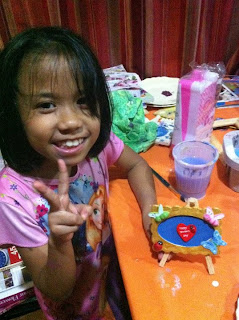Alhamdulillah, I attended a course handled by dedicated Dr Othman Taib, the founder of drotspss.blogspot.com. An award winning blog dedicated to novice researchers (like me!)
One of the most precious things I learned (and it might be a tad late for me) is filling in the one page Research Framework. It does look simple, but it needs in depth thoughts. But this simple piece of paper will give you (and your supervisor and the panel of assessors for your proposal defense) a greater idea of your research, what's lacking and more. Fantastic and highly prescribed for novice researchers, masters and PhD students, preferably the beginners.
This what's mine looked like... you can click on the photo's caption if you really want to read it!
I showed this to my concern supervisor, after being absent from seeing him for about 4 months (pre-delivery admission to ward, post-admission of the twins to NICU for a month).. and to my relieve, he was satisfied that I'm on track (though the RFOT I submitted needed a few amendments, but at least he believes that I have a clear idea of what I'm doing!) And so will you, after you fill this one page RFOT! Alhamdulillah, doing this gives me a kick start or a launch pad after being stuck in a deep end for sometime.
And if you are interested in making your own, this is a blank RFOT template (this is the latest and simpler version of RFOT) and an example that you can refer to. (However, if you like the version that I'm using up there, click here for the blank template). Dr Othman gave his full permission for all to make use of this template.. May Allah showers him with more blessings and greater ease in doing his work.. aamin.
All the best, folks!
One of the most precious things I learned (and it might be a tad late for me) is filling in the one page Research Framework. It does look simple, but it needs in depth thoughts. But this simple piece of paper will give you (and your supervisor and the panel of assessors for your proposal defense) a greater idea of your research, what's lacking and more. Fantastic and highly prescribed for novice researchers, masters and PhD students, preferably the beginners.
This what's mine looked like... you can click on the photo's caption if you really want to read it!
 |
| RFOT Azza |
And if you are interested in making your own, this is a blank RFOT template (this is the latest and simpler version of RFOT) and an example that you can refer to. (However, if you like the version that I'm using up there, click here for the blank template). Dr Othman gave his full permission for all to make use of this template.. May Allah showers him with more blessings and greater ease in doing his work.. aamin.
All the best, folks!
It's not enough to mildly want what you want -
you must wildly want what you want.
There are no wishy washy CEOs -
or
wishy washy nobel peace prize winners -
or wishy washy winners of anything.
It helps to remember that life is rarely linear -
there are always
zigzags on your path to your dreams.
True failure only happens when you
abandon your quest.
Keep on questing.
















